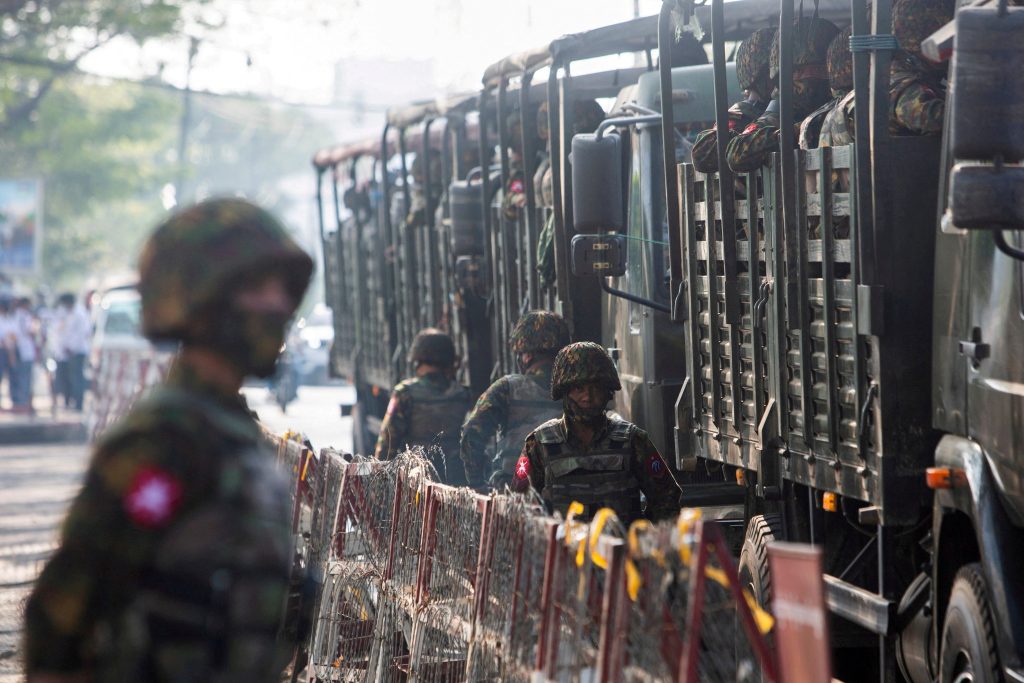In the third year under military rule, Myanmar faced greater socioeconomic hardship caused by intensified conflict across the country, severe macroeconomic instability and natural disasters in 2023. The UN estimated that 18.6 million people — one-third of the population — will likely be in need of humanitarian aid in 2024. This figure includes almost 2.6 million people who are internally displaced as of January.
The armed conflict between the military junta’s troops and the Three Brotherhood Alliance of three ethnic armies — the Myanmar National Democratic Alliance Army, Ta’ang National Liberation Army and Arakan Army — in October 2023 alone caused more than 660,000 displaced people in 10 states and regions as of mid-December 2023. The military conceded that it had lost several towns including Chinshwehaw, a strategic town in Shan State bordering China’s Yunnan province.
A month before the incident, the junta’s information ministry reported that border trade with China was valued at over US$1.8 billion between April–September 2023. Border trade statistics reported by the commerce ministry of the junta showed that the imports via Chinshwehaw, goods ranging from vehicles to agricultural machinery to fertiliser, accounted for US$528.5 million — 52 per cent of the total imports via the Myanmar–China border between April 2023 to January 2024.
Military spending has been under-reported since General Ne Win’s era. For the 2023–2024 fiscal year, the junta allocated approximately US$2.7 billion — or 17 per cent — of its total spending for defence. Meanwhile, only 2.5 per cent was allocated for health and 6.6 per cent for education. Since the 2021 coup, UN human rights experts documented that off-budget military expenditure reached at least US$1 billion for arms and weaponry manufacturing. Combined military spending through the budget law and off-budget expenditure accounted for 4.9 per cent of Myanmar’s GDP in 2023.
In addition to political and economic instability, in May 2023, Myanmar experienced Cyclone Mocha, which affected more than 235,000 households in the western part of the country. The World Food Programme estimated that 12.9 million people are food insecure because of high food prices and reduced agricultural production, among other reasons. A satellite-based assessment by the Food and Agricultural Organization of the UN showed that 327,000 hectares of agricultural land had been impacted at different levels of severity by flooding in May 2023.
Myanmar relies heavily on imports of gasoline, fertiliser, pharmaceutical goods, palm oil and processed foods. The Myanmar kyat depreciation against the US dollar increased by 22 per cent, from K2850 to K3490 per US dollar between January–December 2023. This depreciation of the local currency and the shortage of US dollars resulted in higher costs and prices of imported goods.
A significant number of public and private facilities have been destroyed by military arson attacks. More than 1000 attacks have been launched against health infrastructure and personnel since the coup.
The Humanitarian Needs and Response Plan for 2024 based on the 2023 Multi-Sector Needs Analysis by the UN Office for the Coordination of Humanitarian Affairs indicated that over 30 per cent of school-age children are not enrolled in any form of learning due to COVID-19, the military takeover, conflicts, economic hardship and natural disasters. It also highlighted that security concerns, instructions from authorities, exposure to conflict and teacher shortages are the key reasons for school closures and the lack of access to education.
The World Bank projected that Myanmar’s GDP will grow by just 1 per cent in 2024, given a slowdown in various sectors including agriculture, manufacturing and trade due to high inflation, kyat depreciation, logistics disruption and ongoing conflict across the country.
Between 2020–2023, many farmers in conflict-affected areas, especially in northern and eastern Shan State, expanded opium cultivation for their basic livelihoods because of rising fuel, fertiliser and transportation costs. In 2023, Myanmar became the top opium producer in the world since there was a sharp decline in opium cultivation in Afghanistan as the Taliban introduced a strict ban on opium cultivation.
Still, what is more important to note is that there was a dramatic increase in opium production in Myanmar after the COVID-19 pandemic and the military coup. Opium production increased from 508 metric tonnes in 2019 to 1080 metric tonnes in 2023, according to the annual opium survey conducted by the UN Office on Drugs and Crime. In addition to the opium production, an alarming trend is the increase in methamphetamine produced by militias in Shan State as well as domestic drug usage aftermath of the military takeover.
The overall impact of armed deadlock between the military junta and resistance forces on the humanitarian crisis will keep worsening as long as the dictatorship remains in power. This is no longer an internal problem in Myanmar. The unsolved Rohingya crisis, the daily flow of refugees into neighbouring countries and re-emerging illicit drug trade have already been alarming problems at the regional and international levels.
Soe Nandar Linn is a Doctoral Student at the Centre of ASEAN Community Studies, Naresuan University in Thailand. The views expressed here are solely those of the author.
This article is part of an EAF special feature series on 2023 in review and the year ahead.

